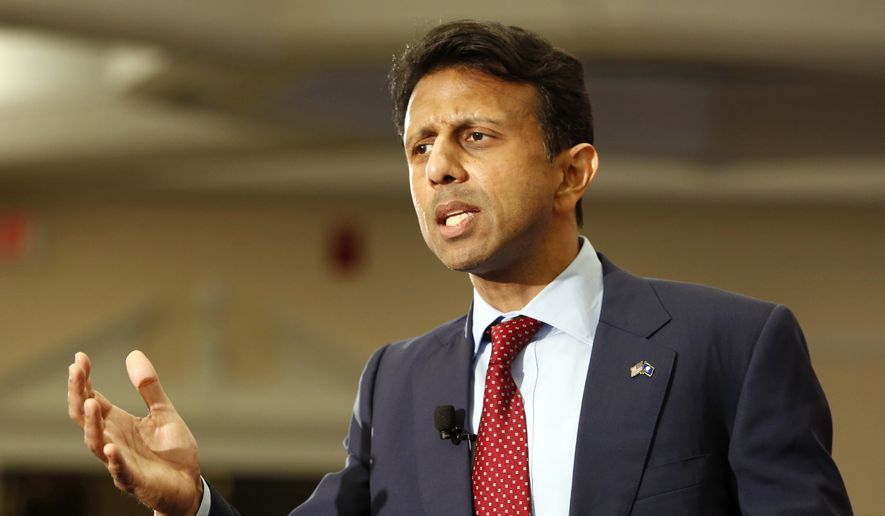Pivotal Supreme Court rulings on same-sex marriage and Obamacare are reverberating in the states, where some officials are slow-walking overnight changes to their marriage laws and others want to retool their approaches to health care reform now that federal subsidies are on firm footing in all the states.
The twin rulings, handed down in a tumultuous 24-hour period last week, differed greatly in subject matter but shared a common theme: Whether the states would be divided into discrete camps on issues of social and economic consequence.
Louisiana Gov. Bobby Jindal, a Republican, said Sunday that his state will comply with the 5-4 ruling Friday that gave same-sex couples the right to wed in all states, suddenly legalizing the practice in the final 13 states.
“Of course we’re going to comply with a court order; we don’t have a choice,” Mr. Jindal, who last week announced that he is running for president, told NBC’s “Meet the Press.”
He said he wants to see the appellate court papers that make it official before his state complies.
On Obamacare, the justices said Thursday that qualified customers could access government subsidies on Obamacare’s exchanges no matter where they live, preserving tax credits for people in dozens of states that didn’t set up their own health care exchanges.
Pennsylvania Gov. Tom Wolf, a Democrat, said he would tear up the backup plan he submitted to the Health and Human Services Department in case the justices invalidated the subsidies that 382,000 of his residents use to afford plans on the federal HealthCare.gov website.
“I took steps to protect Pennsylvania’s consumers by putting in place a contingency in the event the Supreme Court ruled people are not eligible for subsidies, but I am pleased to say that we will no longer need to rely on this plan,” he said.
Officials in Delaware, meanwhile, said they will continue to “weigh the costs and benefits” of a state-run exchange against their current model — a federal-state partnership that uses HealthCare.gov — and make a decision by the end of July.
In Arkansas, the only other state to submit a backup plan, Gov. Asa Hutchinson, a Republican, said he was disappointed with the Supreme Court’s decision and that he was “convinced now more than ever that we need to proceed with caution” in considering whether a state exchange would be worth it.
One of his state’s past governors, Republican presidential candidate Mike Huckabee, called the Obamacare ruling an “out-of-control act of judicial tyranny.” He also said county clerks who object to the same-sex marriage ruling should be exempted.
“I’m not sure that every governor and every attorney general should just say, ’Well, it’s the law of the land,’ because there’s no enabling legislation,” he told ABC’s “This Week.”
Some states will be tempted to exempt themselves from running an Obamacare exchange, too, by ditching their faulty state websites and joining the 37 states that use HealthCare.gov.
Vermont Lt. Gov. Phil Scott, a Republican, said his state should consider a regional exchange with Connecticut or make a wholesale switch to the federal exchange.
“For 18 months, officials have dismissed repeated calls to explore alternatives to our dysfunctional exchange, saying to do so would put Vermonters at risk of losing their subsidies,” he said Thursday. “Now, with today’s U.S. Supreme Court ruling that federal subsidies can be offered in both state and federal health care exchanges, that fear is eliminated, and it’s clear we must immediately explore alternatives to Vermont Health Connect.”
Minnesota state Rep. Tara Mack, a Republican, responded to the ruling by arguing that it is time for the state to abandon its state exchange, which has had technological problems. She said “with over $250 million already wasted on the broken MNsure website, it’s time to stop throwing good money after bad.”
Their calls to action reflect a broad shift toward use of HealthCare.gov, which stumbled out of the gate but recovered after a team of technical gurus salvaged the site in late 2013, setting up a relatively successful finish to Obamacare’s first enrollment period and a calm second round.
State exchanges in Oregon and Nevada couldn’t recover from early glitches, however, so they turned to the federal government for their Web enrollment needs.
“Over time, it seems likely that additional state exchanges might transition to using HealthCare.gov, especially as they continue to grapple with how to ensure sustainability long-term,” said Elizabeth Carpenter, a director at Avalere Health, a Washington-based consultancy. “However, those states are likely to remain active in managing their insurance markets and conducting other on-the-ground activities such as consumer outreach and support.”
• Tom Howell Jr. can be reached at thowell@washingtontimes.com.




Please read our comment policy before commenting.